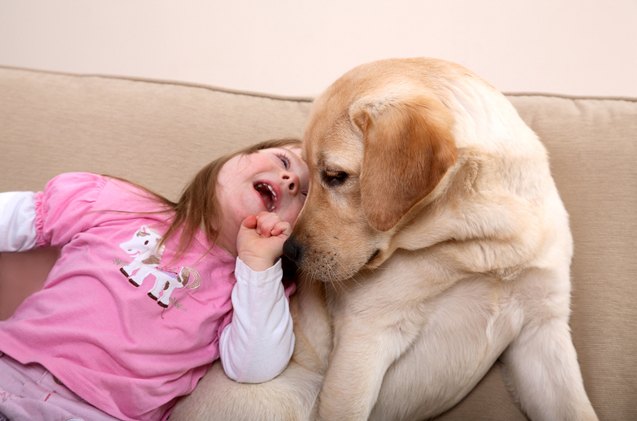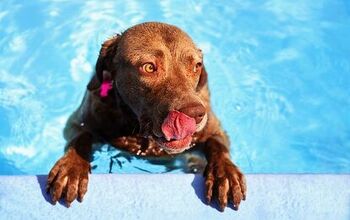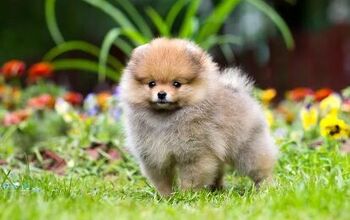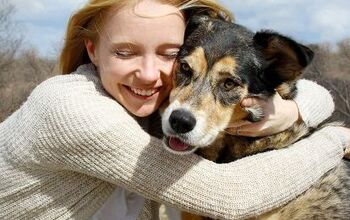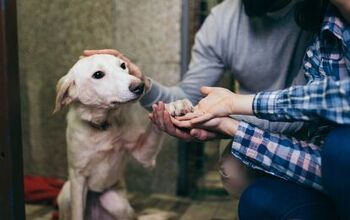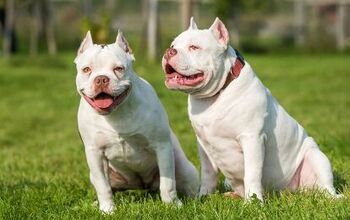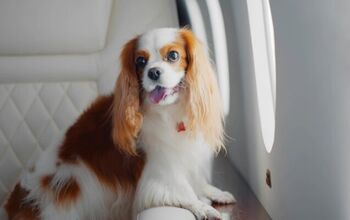Top 10 Therapy Dog Breeds

Dogs play so many important roles in society. They are our friends, our family, our saviours, our companions, and sometimes even our therapist. It might sound a little silly given that dogs can’t talk, never mind attend several levels of post secondary education and order the specialized leather couch necessary to become a therapist. But of course, therapy dogs aren’t that literal in their profession. If you’ve ever owned a pup, then you can probably guess how doggos are able to provide therapy to their owners. However, if you’re a little confused then let’s get into the details.
A therapy dog is one that is trained to offer comfort and affection to individuals in nursing homes, hospitals, schools, hospices, and during a crisis. Therapy dog breeds are also useful for children who have autism and various learning disabilities. Essentially, the job of a therapy dog entails providing emotional support, relieving stress, and brightening lives of humans in need. The service that these dogs provide is extraordinary and important. It takes a special type of pup to be up to the task.
Even though it might seem like all dogs could be therapy animals, that’s simply not the case. Only a few doggos are capable of delivering on the tasks required for a therapy dog. In addition to the fact that the canine in question must enjoy their position, they must also have a pawesome personality to become a therapy animal in the first place. These dogs must be able to stay calm in a busy setting, be sociable and friendly to strangers, and of course, have a lot of patience and plenty of love to give. Naturally, there’s also the question of passing rigorous training course with flying colors. Again, that’s not exactly something many dogs can do. Or even humans, for that matter!
To get your dog certified as a therapy animal, you’ll have to make sure that your own personality makes you a good match for the role of a therapy dog handler. Unless you’re a patient yourself and are looking to get a dog that would assist you personally, you’ll have to be ready to take out your pooch to mingle with people and be responsible for their actions. Also, you’ll have to work with your dog and teach them the specific manners that will ensure they are always on their best behavior. In other words, you’ll have to be a part of a pawesome therapy duo and not just a proud pawrent to a wonderful pooch! This is a big responsibility for owners as well. It’s not to be taken lightly, but the rewards are plentiful and undeniable.
What makes therapy dog breeds different from service dogs (such as those utilized by individuals with physical disabilities, like seeing eye dogs or hearing dogs) is that they typically do not perform tasks. They are not supposed to remind a person to take their meds or alert them of a seizure beforehand. They certainly are not trained to do work for people either, such as guiding them through the street or pulling their wheelchair. These are all responsibilities of service dogs. Because all that is required is an even temperament and a surplus of love and affection, many breeds make great therapy dogs. It’s a very different skill set that requires a very different type of pooch than a service dog. So which dogs are best suited to be trained as therapy dogs? Well, that’s why you are here, so keep on reading for our picks for Top 10 Therapy Dog Breeds. (Photo credit: tomaszm/Bigstock.com)
Kicking off our list of therapy dog breeds is the Lab. The Labrador Retriever has consistently been named the most popular breed in the United States – perhaps it has something to do with its inclusion in our top therapy dog breeds. Not only do these dogs make good pets, but they are also great as therapy dogs due to their intelligence and gentle demeanor. In fact, this is also one of the most popular service dog breeds, as well. There’s very little these pooches do not excel at! They are remarkable creatures that we are so lucky to get to share space with.
This is a canine breed that can be described as versatile and hardworking, so these dogs can be trained in a wide range of areas with ease. They are quite smart, social, loyal, and good-natured. This makes them a wonderful choice for families and anyone in need of a therapy dog. Plus beyond all of that, these pooches are also good listeners, and they really aim to please by doing their best at whatever task they are given to fulfill. Labs will also be there for you and genuinely care about your disposition.
Overall, Labs are very people oriented and strive to please their owners, which is why training them to be a therapy animal should be a breeze. These wonderful doggos are known to have a lot of patience and are pretty laid back, so they won’t feel uncomfortable in the rather social role that many therapy dogs have! Labrador Retrievers take well to new people and they are very obedient when properly trained. In a nutshell, this unique set of personality traits makes Labrador Retrievers ideally suited to provide comfort to those that need it most. If you have a Lab and have been thinking about training them to be a therapy dog, you really should take that next step and make it happen. (Photo credit: ©iStock.com/standby)
The German Shepherd is a highly versatile breed, primarily because its intelligence enables it to be trained for a variety of different purposes. For many people, the first thing that comes to mind when someone says K9 is a picture of a brave German Shepherd, and this is no coincidence. These brilliant canines often work as police dogs (sometimes partnered with Jim Belushi), and the traits that make them a good match for that career are what makes them a good fit for the work therapy animals do. In fact, German Shepherds make fantastic therapy dogs in a myriad of settings, such as nursing homes and hospitals, and they work wonderfully with kids and adults alike.
Despite their “no-nonsense” image, German Shepherds are gentle, kind, and infinitely patient. They are trainable, and they enjoy working, always aiming to please their human companions. On top of all that, even though they tend to closely bond with their family, they’ll happily accept cuddles and praise from strangers, too (Which any good boy would do, in all honesty.). German Shepherds are friendly dogs who are loved wherever they go. That’s a major a part of their charm! In addition to their remarkable intelligence, German Shepherds are eager to please and obedient, making it easy to train them to become a therapy animal.
These dogs are fiercely loyal and can be very sweet natured, which makes them an excellent therapy dog breed. There’s a reason why these dogs are so popular. They truly can do it all. It would almost be annoying if these pups were so darn lovable and adorable. (Photo credit: Peter Kunasz/Shutterstock.com)
3. Greyhound
When you think of therapy dog breeds, the Greyhound may not be the first breed that comes to mind. However, they perform the role exceedingly well. These sweet, peaceful, and gentle dogs are known for racing, but they are also quiet and affectionate as a breed. Most Greyhounds are adopted when they retire from their career as a racer and their new calling as therapy animals fits them perfectly! You might also see Greyhounds working as therapy dogs in nursing homes and hospitals, where they can provide emotional support and companionship. These dogs simple help people feel better, no matter where they are.
These slender and athletic pooches are quite mellow, and their calm and composed behavior makes them a good therapy dog breed. Some might even say Greyhounds are a natural at this job! They are intuitive and just feel that some humans need their comfort, whether it’s just lying down by their side or giving out some much-needed cuddles.
Greyhounds are also sensitive, likely to notice any sound that is out of place. This breed is particularly useful as a sleeping companion because they do not bark and they enjoy spending time curled up in bed. (Photo credit: Jagodka/Shutterstock)
4. Beagle
The Beagle is a small dog known for its floppy ears and its black, white and brown coloration. But these cute doggos have much more to offer than just good looks! Even though they are naturally even-tempered and easy going, when properly trained, these classic pooches thrive in the role of therapy dogs. Their amazing personality traits truly shine through when they have the opportunity to share them with the world. While most Beagles will form a close bond only with their families, that doesn’t mean they won’t charm the pants off strangers: their friendly attitude is bound to make them popular with everybody who meets them! Beadles are just that loving and lovable.
These little dogs are gentle, fun, active, social, and entertaining, but they are also content to cuddle up for some quality time with a friend. Beagles are very friendly with new people, and they also tend to get along well with other animals, all qualities that make for an excellent therapy dog. Bringing a Beagle out to meet a group of strangers were practically guarantee that everyone leaves with a smile on their face. (Photo credit: Solovyova Lyudmyla/Shutterstock.com)
5. Rottweiler
Bet you didn’t expect this tough-looking pooch to make our therapy dog breeds list, huh? Though often assumed to be a dangerous breed, the Rottweiler is actually incredibly calm and friendly with people. For that reason, these pooches can make wonderful therapy dogs. They’re what you might call “gentle giants.” Yet, because they’re so often judged by their appearance, not many people know how loving and sweet these canines can be. The truth is that, if properly trained, Rottweilers make excellent therapy dogs and bring support and comfort to those who need it the most, especially because they actually feel super happy when given a job to accomplish. Rottweilers love performing any task well, especially when that task involves making humans happy.
These dogs exhibit all of the most important qualities in a therapy dog – a calm demeanor, confident attitude and great intelligence. Plus, these dogs are loyal, social, watchful, great with kids and seniors, and they seek out attention from all people. All they need is to be given a chance to break the stereotypes that follow them around! The Rottweiler can be aloof around new people but once this dog gets to know you, you will have a friend for life. And, trust us, it’s a furry friend you will definitely want to have by your side. These animals know how to bring out the best in the people around them.(Photo credit: Rita Kochmarjova/Shutterstock.com)
The Swiss national dog is famous for its reputation of being an avalanche rescue dog: the image of a St Bernard with a brandy barrel hanging from their collar is practically seared in everyone’s minds (Even though it’s believed this is a myth rather than a historical fact. The Beethoven movies portray these breed more accurately.). It doesn’t come as a surprise, then, that nowadays these big dogs are still doing rescuing of their own. Ganted, it’s rescuing of a different kind. Emotional rescuing! The Saint Bernard is a very popular therapy dog breed and these fabulous doggos now help people overcome stress and support them through ruff times. The laid-back, cool pawsonality of these dogs makes them a perfect choice! No brandy required!
Often referred to as a gentle giant, the Saint Bernard is particularly popular as a therapy dog for children due to its ‘giant yet goofy’ looks. These large dogs are wonderful canine companions to have around, as they are attentive, loving, loyal, and patient, as well as warm and caring. Kids love hugging these big and cuddly doggos. And while these dogs are incredibly protective and obedient, they are also very patient. They will will never snap or bark at a child pulling on its tail or fur. They are far too calm and loving to ever behave like that. (Photo credit: Katrina Brown/Shutterstock)
7. Pomeranian
This little ball of fluff is super pawsitive and outgoing. Yep, mingling with people is definitely not the issue for the Pomeranians! Despite being a small dog breed, these cute canines can be pretty laid back and calm in large crowds. Their lovable personality and adorable looks make them an instant favorite- nothing like petting a real-life teddy bear to instantly make you feel better! Additionally, Pomeranians are an intelligent dog breed that responds well to positive reinforcement trainin. So certifying an even-tempered Pom as a therapy dog shouldn’t be a problem. They are practically begging to be trained as therapy animals.
The Pomeranian is a very small breed often favored by elderly individuals who need a companion at home. Their sweet nature and relatively low maintenance care make them a good fit for seniors who cherish having a furry friend in their golden years. These little dogs require relatively little exercise but they will take all the love and affection they can get- and give a lot of it in return. Just try being sad around a Pomeranian. It’s practically impossible! (Photo credit: antpkr/Shutterstock)
8. Poodle
You knew this pooch was going to make it onto our therapy dog breeds list! The Poodle is one of the most intelligent dog breeds out there, which means that they typically respond well to training. They are fast learners and quite the four-legged charmers. It’s really hard not to be impressed by their antics. Poodles come in various sizes (from toy to standard) and they are all a great choice for therapy dogs. Standard poodles are the most common choice for service animals. Whether it’s a role of a seeing eye dog or a seizure alert canine, poodles are always up to the task. These dogs are smart, full of love, and very friendly. Their sweet and loving nature makes them fantastic emotional support animals, too!
It’s the personality of the Poodle that allows it to stand out against other breeds. These pooches can be described as loyal, alert, and trainable. They learning tricks and commands rather quickly and tend to impress everyone around them in the process. Plus they are friendly, even though they might be a little shy around new people. On top of all of that they are devoted, easily bonding to their human companions quickly. They easily learn how to recognize someone’s mood and empathize with them. Miniature Poodles tend to be more active and will gladly follow you around. Standard Poodles can be a bit more reserved, yet they are still full of energy. No matter what their size, though, if it’s a constant and trustworthy friend that you seek, Poodles will not disappoint, as these sensitive dogs crave attention, affection, and praise, so they are willing to please.
Additionally, these dogs have thick, curly coats but they are generally considered to be hypoallergenic which makes them a good option for people with allergies. Ideal if you are sensitive to dog hair but want a therapeutic pooch by your side! (Photo credit: Eric Isselee/Shutterstock)
9. Pug
The Pug is a small breed known for its wrinkled skin and big, welcoming puppy-dog eyes. While some might argue that one look at a Pug’s adorable face has a therapeutic effect all by itself, that’s not why this compact pooch got on our list. Nope, it’s their easy going and sociable nature that makes them strong therapy animals. These dogs love human contact and thrive on attention and that’s always a plus for pooches that are looking to work as therapy dogs. Not only will they enjoy being petted, but most Pugs also won’t mind if a stranger is doing the cuddling. As long as they’re in the spotlight, Pugs are happy! To boot, they are usually easily motivated and don’t have a problem with training, making it easier to make things official and certify them as a therapy dog.
These dogs do have a lot of energy but they also have a natural desire to please people, which works to their advantage. Pugs get along well with people of all ages, but they work particularly well with children suffering from various neurodevelopment disorders including autism. In fact, when it comes to therapy dogs for kids, Pugs are a smart choice, as they tend to bond with children really well and they have an enthusiastic personality that brings people joy. Nothing will make you smile quite like a pretty little Pug. (Photo credit: ©iStock.com/Melissa711)
10: French Bulldog
Finishing off our therapy dog breeds list is the French Bulldog. These adorable little dogs are known for their short, compact structure and their bat-like ears. The French Bulldog, also known as the Frenchie, is an affectionate and non-confrontational breed. Originally bred from larger bulldogs to serve as lapdogs, the French Bulldog is perfectly content to spend the afternoon cuddling on someone’s lap. And as we all know, nothing makes you feel quite as good as a fluffy friend cuddling up into your lap.
French Bulldogs can make great therapy dogs because they are described as even-tempered, friendly, and quiet. They make wonderful companions who can bring a smile to your face and help you feel calm and loved. Also, these little pooches really crave attention and affection, so they enjoy being around people and interacting with them as much as possible. Plus, in the same way that they desire to be loved, they can also give unconditional love to those who show them kindness and affection. That can definitely make a positive impact on someone’s life. It certainly won’t make anything worse.
Overall, Frenchies are a smart choice when looking for a therapy dogs that will work well with both children and adults. They thrive on love and attention, so that can seem a bit needy for some people. Fortunately, they also tend to give a looot of love and affection in return. Their sweet nature and friendly disposition make French Bulldogs a great therapy dog breed, especially with adults in need of emotional support. (Photo credit: Eric Isselee/Shutterstock)

Kate Barrington is the loving owner of two cats (Bagel and Munchkin) and a noisy herd of guinea pigs. Having grown up with golden retrievers, Kate has a great deal of experience with dogs but labels herself a lover of all pets. Having received a Bachelor's degree in English, Kate has combined her love for pets and her passion for writing to create her own freelance writing business, specializing in the pet niche.
More by Kate Barrington



